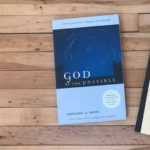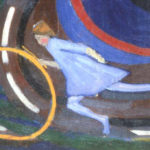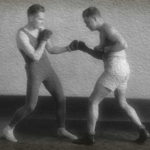Open Theism
What Does It Mean that God Hardens Hearts?
Category: Q&A
Tags: Choice, Determinism, Free Will, Is God to Blame?, Open Theism, Predestination
Topics: Interpreting Violent Pictures and Troubling Behaviors
Some argue that passages which speak of God hardening human hearts (Jos 11:19-20; Ex 7:3; 10:1; Rom 9:18) demonstrate that God controls everything, including people resistant to this declared intentions. He hardens whomever he wills,…
Podcast: The Making of God of the Possible
Category: ReKnew Podcast
Tags: God of the Possible, Open Future, Open Theism
Greg talks about making his book “God of the Possible,” then offers his initial thoughts on Thomas Oord’s book “God Can’t.” http://traffic.libsyn.com/askgregboyd/Episode_0468.mp3
Podcast: If the Future is Open, How Do You Explain Prophecy?
Category: ReKnew Podcast
Tags: Objections to Open Theism, Open Future, Open Theism
Greg considers prophecy through the lens of open theism. http://traffic.libsyn.com/askgregboyd/Episode_0448.mp3
Podcast: Is Open Theism an Accommodation?
Category: ReKnew Podcast
Tags: An Open Orthodoxy, Cross Vision, Crucifixion of the Warrior God, Cruciform Theology, Divine Accommodation, Open Future, Open Theism
Or for that matter is accommodation an accommodation? Greg talks about things that impact God. http://traffic.libsyn.com/askgregboyd/Episode_0407.mp3
Podcast: Can God Be Surprised?
Category: ReKnew Podcast
Tags: Open Theism
Greg talks heaven and hell in this solid little episode. http://traffic.libsyn.com/askgregboyd/Episode_0394.mp3
Podcast: Is God Capable of Total Control?
Category: ReKnew Podcast
Tags: God's Sovereignty, Open Theism
Greg talks the consequences of creating autonomous persons. http://traffic.libsyn.com/askgregboyd/Episode_0355.mp3
5 Observations about God Changing His Mind
Category: General
Tags: An Open Orthodoxy, Omniscience, Open Theism
One of the most significant passages that supports the open view of the future is found in Jeremiah 18. This is one of the numerous times where we find God changing his mind in response…
Re-Thinking Divine Sovereignty
Category: General
Tags: Cross, God's Sovereignty, Open Theism, Power
Many people in the church have been taught that divine sovereignty is synonymous with unilateral control. Some have even argued that if God is not in control of everything, then something must be in control…
Podcast: Is God Outside of Time?
Category: ReKnew Podcast
Tags: Attributes of God, Open Theism, time
Greg discusses the nature of time, the importance of sequence, and the centrality of poetry. http://traffic.libsyn.com/askgregboyd/Episode_0286.mp3
Podcast: Where Does Omniscience Fit In Within Open Theism?
Category: ReKnew Podcast
Tags: Objections to Open Theism, Omniscience, Open Future, Open Theism
Greg pontificates on what God knows. http://traffic.libsyn.com/askgregboyd/Episode_0280.mp3
Podcast: Does the Cruciform Hermeneutic Sabotage Open Theism?
Category: ReKnew Podcast
Tags: Crucifixion of the Warrior God, Cruciform Theology, Objections to Open Theism, Open Theism
Greg plays Peek-a-Boo with God and considers whether those verses Open Theists use to support Open Theism might simply be times when God is accommodating for us. http://traffic.libsyn.com/askgregboyd/Episode_0236.mp3
Podcast: Was THIS World the Most Likely World and Wouldn’t God Have Anticipated It?
Category: ReKnew Podcast
Tags: Divine Foreknowledge, Foreknowledge, Open Theism
Greg considers what God might have risked and might have expected for this world. http://traffic.libsyn.com/askgregboyd/Episode_0224.mp3
Podcast: What is the Difference Between Open Theism and Process Thought?
Category: ReKnew Podcast
Tags: Objections to Open Theism, Open Future, Open Theism, Process Theology, Trinity and Process
Greg openly processes the major differences between Open Theism and Process Thought. http://traffic.libsyn.com/askgregboyd/Episode_0218.mp3
Podcast: Is an Open Future World a Logically Possible World?
Category: ReKnew Podcast
Tags: Open Future, Open Theism
Greg gets technical in this abstract, yet profound, introduction to an open theist’s interpretation of the square of opposition. http://traffic.libsyn.com/askgregboyd/Episode_0217.mp3
Podcast: What Does God Actually DO in the World?
Category: ReKnew Podcast
Tags: Open Future, Open Theism
Greg discusses what a God, who takes his hands off of us, who gives up control for us, who accommodates for us, actually does in the world. http://traffic.libsyn.com/askgregboyd/Episode_0215.mp3
Who Rules Governments? God or Satan? Part 2
Category: General
Tags: Cruciform Theology, Government, Open Theism, Power, Satan
In the previous post, I raised the question of how we reconcile the fact that the Bible depicts both God and Satan as the ruler of nations, and I discussed some classical ways this has…
Who Rules Governments? God or Satan? Part 1
Category: General
Tags: Cruciform Theology, Government, Open Theism, Power, Satan
Running throughout Scripture is the motif that depicts God as the ultimate ruler of the nations. On the other hand, the NT teaches that the ruler of nations is Satan. What do we do with…
15 Reasons Open Theism is TRUE (a reply to Andrew Wilson)
Category: Guest Contributor
Tags: Open Theism
Topics: Defending the Open View, Responding to Objections
Article by Dan Kent Recently, Andrew Wilson shared an impressive critique of open theism called: “Responding To Open Theism In Fourteen Words.” Andrew’s article didn’t persuade me, but it did challenge me (seriously!). Below I…
Podcast: Is Open Theism Growing in the World?
Category: ReKnew Podcast
Tags: Open Theism
Greg discusses the place of Open Theism in contemporary Christianity. http://traffic.libsyn.com/askgregboyd/Episode_0149.mp3
Podcast: If Open Theism is True, Does it Make Sense to Pray For Intercession?
Category: ReKnew Podcast
Tags: Open Theism, Prayer
Greg talks about prayer and freedom. Specifically, if free will is so important, why would God override it in answer to prayer? http://traffic.libsyn.com/askgregboyd/Episode_0123.mp3




















